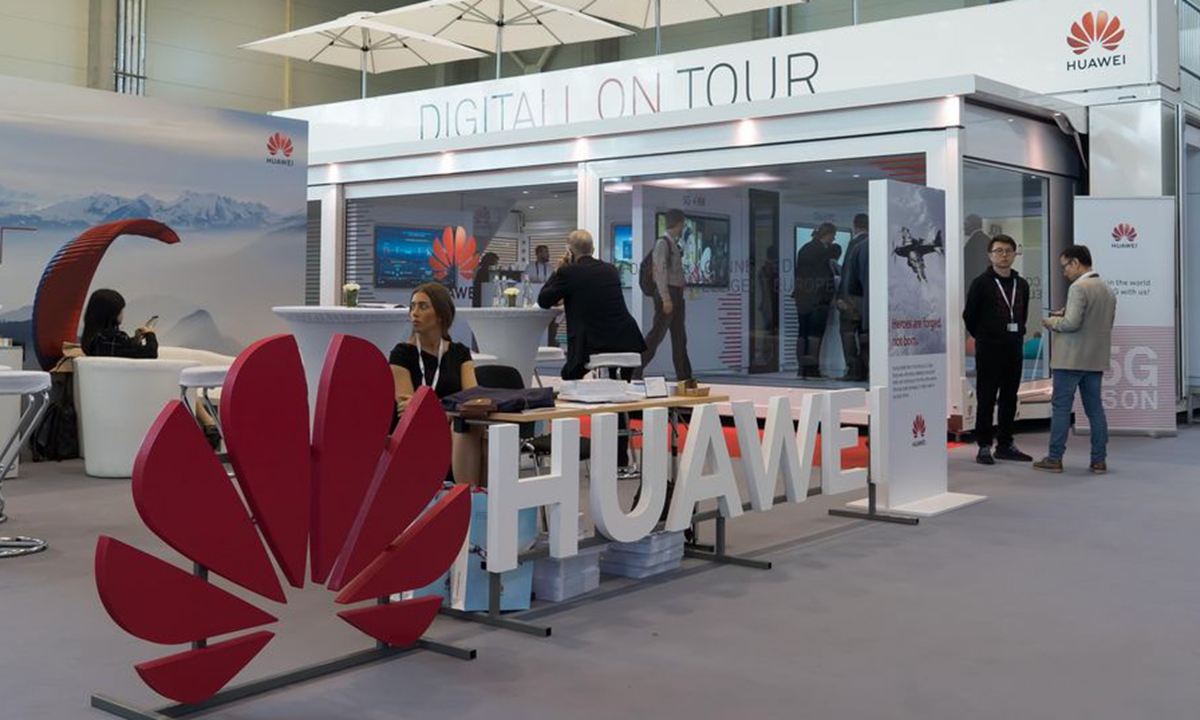TSMC may speed Huawei chips supply
Qualcomm, Apple face countermeasures if tensions with US escalate

Photo taken on Nov. 20, 2019 shows Huawei's exhibition booth during a press preview for the 2019 World 5G Convention in Beijing, capital of China.(Xinhua/Li Xin)
Taiwan Semiconductor Manufacturing Co (TSMC) may be accelerating chip sales to Huawei Technologies to provide up to a year's chips supply, before a possible mid-September ban by the US government, as TSMC may face significant losses if the ban comes into effect, an industry analyst said Tuesday.
TSMC Chairman Mark Liu told the press "We hope that won't happen," when he was asked if his company could fill the gap in orders left by Huawei ban, Reuters reported.
"But if it does, we will replace Huawei's orders in a short time," he said, although it's difficult to predict how quickly that could happen.
Ma Jihua, a veteran industry analyst and a close Huawei follower, told the Global Times that Liu's constrained response reflects the heavy pressure TSMC now faces.
It's not like baking a cake, Ma said - the company would have to rearrange its products and factories after losing this super client of Huawei, which generates 15-20 percent of its annual revenue.
"TSMC is likely accelerating production for Huawei now to help it build up a 6-12 month chips reserve, ahead of the 120-day grace period that expires in mid-September," Ma said.
Huawei and TSMC didn't reply when reached by the Global Times for comment.
The US Commerce Department announced on May 15 that it was proposing a new rule to require licenses for sales to Huawei and its 114 subsidiaries for chips made abroad with US technologies. The department is expected to announce details of the new rule in mid-July.
The semiconductor industry is lobbying the US Commerce Department to interpret its new rules flexibly, the Asia Times reported in May. Considered by analysts as a compromise in exchange for a permission to sell chips to Huawei, TSMC said on May 15 that it plans to build a factory in the US.
The US' irrational move to squeeze Huawei out of the global industry chain will be costly for America, as it would be more expensive and time-consuming for the US to build 5G networks, Xiang Ligang, an industry analyst, told the Global Times Tuesday.
"Given that the US has built only about 20,000 5G base stations, significantly fewer than China's more than 250,000, the US may lag behind China in the 5G era when social efficiency is expected to be greatly raised and costs lowered.
In the industry worldwide, Huawei has the most declared 5G patents at 2,386 patent families, followed by LG with 1,388 patent families and Samsung with 1,353 patent families. Ericsson is No.4 and US-based Qualcomm is No.5, according to a survey jointly released by technology research firm GreyB Services Pte and analytics firm Amplified AI Inc on June 2.
This is Huawei's leverage - the US has to pay Huawei whatever crackdown measures it takes, Xiang said, noting that for example, Apple has to pay Huawei if the US company uses relevant 5G patents such as algorithms.
In addition, if the US moves to ban all chip sales to Huawei from Taiwan and South Korea, the Chinese mainland may counter by restricting the use of Qualcomm chips in government agencies and key sectors related to national security, conduct anti-monopoly investigations and impose punitive tariffs on US technology companies, Ma said.
"How China reacts to the US crackdown depends on the endurance of Huawei," Ma said. "The more progress Huawei makes in chip research and development, the more aggressive China's countermeasures will be," he said.
The Global Times reported in May that China is ready to put certain companies on its "unreliable entity list," impose restrictions or launching investigations into US companies including Qualcomm, Cisco and Apple according to Chinese laws and regulations like the Cybersecurity Review Measures and Anti-monopoly Law, and halt airplane purchases from Boeing.

